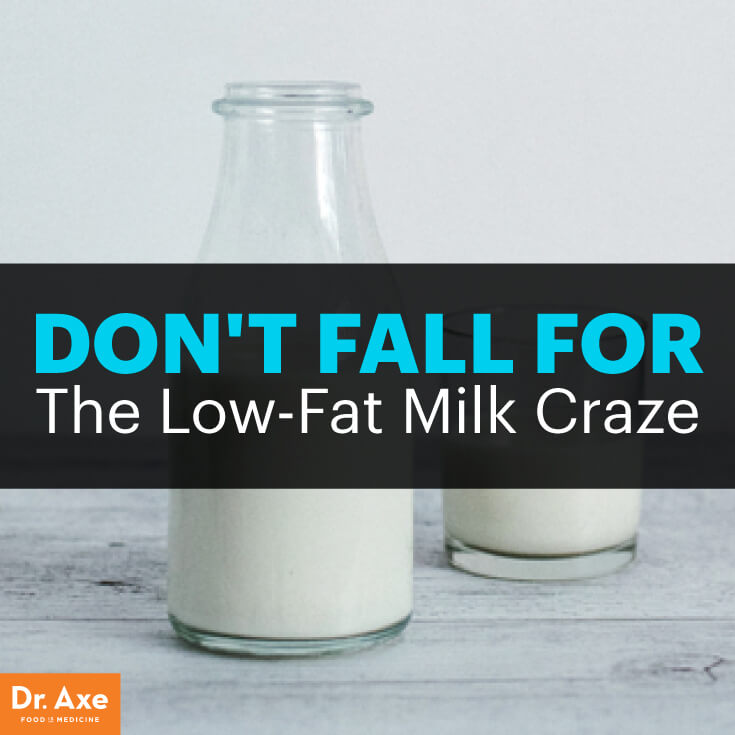The Dangers of Low Fat Dairy

So many of us have been bought up in the ‘low fat’ era where the sheer thought of eating anything that contains fat, made you instantly worry about gaining weight… There is so much research that has now been done that totally debunks this and there is a huge move towards increasing the amount of fat we consume.
I came across this great article from Dr Axe which might make you think about that skinny latte you drink every morning…
The Dangers of Low Fat Dairy
There’s no shortage of low-fat dairy options in your grocery store. And we’ve certainly been programmed to reach for those low-fat and fat-free cheeses, yoghurt and skim milk options over the years. But the question is, are these fat-deprived products really better for us?
According to a growing number of studies, no
Low-Fat Dairy Dangers
We need fat to survive. The right, healthy fat. Still, dietary recommendations continue to discourage Americans from reaching for full-fat milk and other dairy products. A 2016 study published in Circulation is a strong reminder that nutritional policymakers need to reconsider their stance against full-fat dairy. Looking at more than 3,300 people, researchers found that people with the highest byproducts of full-dairy products enjoyed a 46 percent lower risk of developing type 2 diabetes compared to people who ate less full-fat dairy. (1)
That’s just one of the low-fat diet risks science is starting to point out. Another 2016 study published in The American Journal of Nutrition makes another strong case for eating full-fat dairy. (2) Researchers studied more than 18,000 women and found the ones who consumed more full-fat dairy were 8 percent less likely to be overweight or obese compared to the low-fat dairy group.
One theory is that eating full-fat dairy helps people feel fuller longer. Aside from that, low-fat and fat-free dairy products are often laden with added sugar, a potent risk factor for type 2 diabetes, heart disease and even cancer.
Watch Out for Conventional Dairy
The health of the animal and the processing methods of milk can categorize dairy as either one of the healthier foods in the world or one of the worst. If you’re consuming milk, yogurt, butter and cheese produced from conventionally raised cows that are fed a steady stream of antibiotics, your dairy intake may be playing a role in antibiotic resistance. Not just for you, either — also for your family and everyone else in the community. Conventional dairy may also increase your risk of being overweight and even of getting cancer.
The pasteurization process that most conventional dairy products undergo destroys essential enzymes and probiotics, as well as alters vital amino acids. Nearly all commercial milk is also homogenized, a process that oxidizes fats and creates free radicals. Free radicals are unstable oxygen molecules that are known to weaken the immune system and result in intestinal inflammation, leading to leaky gut.
In 2013, scientists published a study showing that milk from organic, grass-fed cows contains much higher levels of brain- and heart-healthy omega 3 fatty acids, along with lower levels of inflammatory fats typically found in milk from grain-fed, conventionally raised cows. (3)
My Go-To Dairy Advice
- Raw, fermented dairy from organic, grass-fed goats or sheep is my gold-standard choice, although it can sometimes be hard to find. (You may need to order kefir grains to ferment sheep or goat milk.)
• If you aren’t in the market for sheep or goat milk, look for plant-based alternatives like coconut milk or almond milk. (Look for products without carrageenan.)
• If you’re sticking with cow’s milk, always choose organic, milk from pasture-raised cows to avoid chemicals in milk. If possible, look for organic milk from Jersey or Guernsey cow breeds. They haven’t gone through a genetic mutation that leads to an inflammatory protein called A1 beta‐casein winding up in the milk.
If you would like to read more article by Dr Axe. Go to www.drake.com

